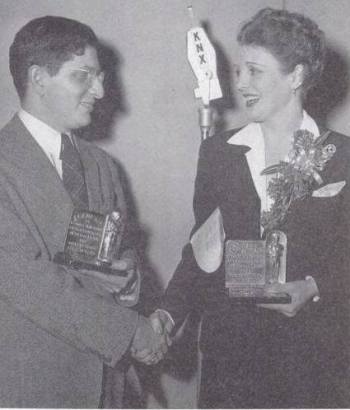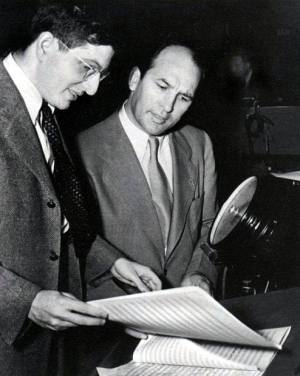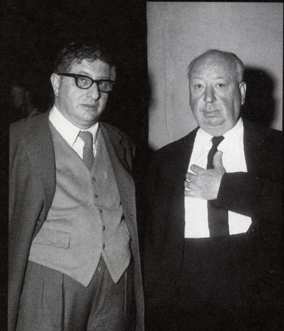
Actress Mary Astor presents Bernard Herrmann with the Academy Award for Best Score for “All That Money Can Buy.”
Bernard Herrmann is a name most avid film lovers know.
Even someone with little film knowledge is aware of his Psycho (1960) score.
You might hear film historian Robert Osborne mention his scores in an introduction to a film on Turner Classic Movies, or read an article where a musician discusses Herrmann’s influence on their album. But for someone highly revered today, Herrmann didn’t feel well respected by his contemporaries during a radio and film music career that spanned from 1934 to 1975.
Bernard Herrmann came to Hollywood in 1940 with a bang. In a time when the flowery and lilting film scores of composers like Max Steiner and Erich Wolfgang Korngold were king, Herrmann provided something different.
His first two films—Orson Welles’s Citizen Kane (1941) and William Dieterle’s All That Money Can Buy/The Devil and Daniel Webster (1941)—yielded Academy Award nominations for Best Score. Herrmann won his first and only Oscar for All That Money Can Buy.
Some of Herrmann’s film scores included Jane Eyre (1943), The Ghost and Mrs. Muir (1947), his personal favorite; and The Day the Earth Stood Still (1951) but they also were overlooked by the Academy.
His third Academy Award nomination was for the 1946 film Anna and the King of Siam. For this film, Herrmann did extensive research on Siamese scales and melodic phrases to capture the geographic tone of the film, according to “A Heart at Fire’s Center: The Life and Music of Bernard Herrmann” by Steven Smith.

Bernard Herrmann with director William Dieterle looking over the Academy Award winning “All That Money Can Buy” score.
But the Academy Award for Best Score that year went to Hugo Friedhofer score for the post-World War II drama Best Years of Our Lives. It was 29 years before Herrmann was nominated again for an Academy Award, and then it would be posthumously.
Some of Herrmann’s most famous scores include those he created when he teamed with director Alfred Hitchcock for Vertigo, Psycho and North by Northwest. This proved to be Herrmann’s greatest artistic collaboration. However, none of those were every recognized by the Academy of Motion Picture Arts and Sciences. Hitchcock himself was nominated five times, but never received an Academy Award for Best Director. The only Academy Award Hitchcock received was the Irving G. Thalberg Memorial Award in 1968.
While he worked as a film music composer, Herrmann perceived himself as a failure, because he never felt he reached his full potential by being a world-class symphony conductor. Film music was low-brow to Herrmann. However, he did see the value in film music.
“Movies need the cement of music: I’ve never seen a movie better without it,” he said. “Music is as important as photography.”
As his career advanced into the 1960s, Herrmann started to distance himself from Hollywood. Herrmann and Hitchcock had a disagreement and parted ways, never to work together again. More films were calling for pop standard-like film scores to sell records, and Herrmann wasn’t willing to lower his artistic standards to make a buck.
“If I were starting my career now, I’d have no career in films,” Herrmann said. “I don’t like the new look in film scores. They have nothing to do with the movie.”

Composer Bernard Herrmann with director Alfred Hitchcock, one of his top artistic collaborators who he later had a falling out with.
All of these changes moved Herrmann to resign from the Academy of Motion Picture Arts and Sciences in 1967, because he “did not approve of music being listed as a technical credit,” according to Smith’s book.
“There’s no point to belonging to an organization in which one is judged by one’s inferiors—not one’s peers,” Herrmann was quoted in the Los Angeles Times. “It was Tolstoy who said ‘Eagles fly alone and sparrows fly in flocks.’ But I’m afraid we eagles of the world are being pushed into sanctuaries.”
Herrmann experienced a career resurgence in the 1970s, when new directors like Brain De Palma and Martin Scorsese sought him out. He passed away on Christmas Eve in 1975 after completing recording for Taxi Driver.
In 1977, Bernard Herrmann was posthumously nominated for Academy Award for Best Score for the films Taxi Driver and Obsession. Jerry Goldsmith won the award for The Omen.
“I remember Charles Ives (composer and Bernard Herrmann’s friend) saying ‘Prizes are for boys, and I’m a grown-up,” said Bernard Herrmann’s daughter, Dorothy in Smith’s book. “I believe Daddy had that same attitude.”
Dorothy said many years later when her father came across his Academy Award, he looked surprised “as if he had forgotten he had even won it.”
Listing of Herrmann’s Academy Award nominations:
| Year | Award | Film |
| 1942 | Nominated for Best Music, Scoring of a Dramatic Picture | Citizen Kane (1941) |
| 1942 | Won for Best Music, Scoring of a Dramatic Picture | All That Money Can Buy (1941) |
| 1947 | Nominated for Best Music, Scoring of a Dramatic or Comedy Picture | Anna and the King of Siam (1946) |
| 1977 | Nominated for Best Music, Original Score | Taxi Driver (1976) |
| 1977 | Nominated for Best Music, Original Score | Obsession (1976) |
To learn more about Bernard Herrmann, follow the upcoming documentary Lives of Bernard Herrmann on Twitter and Facebook.
Comet Over Hollywood is taking part in the 31 Days of Oscar event.
Check out the Comet Over Hollywood Facebook page, follow on Twitter at @HollywoodComet or e-mail at cometoverhollywood@gmail.com

Excellent article— i feel a bit sorry for Herrmann after reading this, but that may just be my reaction and nothing at all to do with the real life of the man / situations. Great piece on this, Comet ! He had a long and, hopefully, prosperous (if not completely satisfying to him …) career; prolific and varied, at the least.
LikeLike
Classic tale of great talent/effort going relatively unrewarded.
True talent creates; the mediocre simply cast votes.
(There’s just something about the word “membership” that brings a sour taste to my throat.)
LikeLike
But in the end? He’ll be the one remembered and appreciated the most. Can you imagine how boring “North By Northwest” would be without his score? What better prize for a grown up, living immortal.
LikeLike
It’s really interesting how the scores he is most revered for today aren’t the ones he was nominated for! While I’m interested in the Academy Awards they are definitely subjective.
LikeLike
I always admired his work and his scores certainly added a lot of vitality to some very great movies. But movies evolved to reach out to younger people in the late 50,s, 60’s, and 70’s, the baby-boomers were the ones who went to the movies and bought records and there’s no mention of the huge impact that TV had on the movie industry, the parents were the ones watching at TV at home, the very ones who loved the movies he scored. The teens were going to drive-ins or standing in line for the huge blockbusters. That said, I’m so glad that my parents loved the classic movies and it’s because of them that I learned early on how great Bernard Herrmann was, particularly with “Citizen Kane”. I really enjoyed reading this article.
LikeLike
Every single one of Herrmann’s Harryhausen scores is Oscar-worthy. What a clueless, cheapjack outfit.
LikeLike
Agreed! It also looks like the only Academy Award Harryhausen won was a special Oscar in 1992.
LikeLike
I love the quotes in this. Imagine forgetting that you’ve won an Oscar! That’s probably a very healthy attitude.
LikeLike
The quotes really cracked me up, honestly. Herrmann was an interesting/quirky guy, so I guess I’m not surprised he sort of forgot.
LikeLike